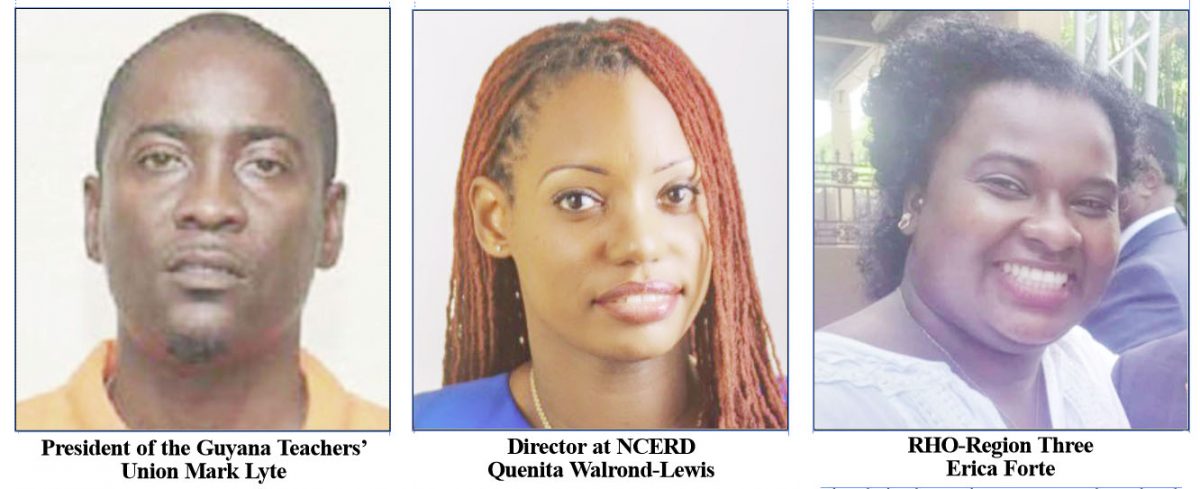Guyana Teachers’ Union President Mark Lyte on Thursday urged the Ministry of Education (MoE) to continuously engage with teachers to tackle issues within the school system, including the response to the COVID-19 pandemic.
Speaking at a panel discussion on the resumption of classes in schools across the country, which was broadcast by the ministry, Lyte stressed said that the MoE has to speak directly with teachers to know what issues are being faced at schools.
He noted that it was necessary to have the students return to the physical classrooms but also noted that there has been vaccine hesitancy among teachers and students and inequity of supplies for schools across the regions. Lyte said that the teachers are the persons who are on the ground and they know what challenges are being faced at schools. For this reason, he said that the teachers are the ones who need to be a part of the ministry’s response to the pandemic. Further, he said that there should be constant reevaluation of the protocols in place with regards to the reopening of schools and to address the inequity in the different regions.
According to Lyte, the ministry took the initiative of providing teachers with care packages but he said that the teachers at Region Six were among many who have not continuously received the bulk of the ministry’s help. He said that the ministry needs to address this issue. He acknowledged that there are circumstances and challenges which prevent regions from getting as much resources as the coastland but added that it is a problem that needs to be assessed.
In addition, Lyte said that the GTU is aware of the need for teachers and students to return to classrooms. However the union also understands the initial fear of getting vaccinated. He said that the vaccines are new and while a fair number of teachers have since become inoculated, the initial response was hesitancy and still is for some. He said that the union will stand with those teachers who are hesitant because every person deserves a chance to make the decision after being educated. He also said that the ministry needed to engage teachers from the start and help to educate them. He explained that misinformation is easily spread and that when the wrong information is shared persons believe it.
Quenita Walrond-Lewis, the Director at the National Centre for Educational Resource Development (NCERD) said that the ministry engaged with teachers and parents during the pandemic more than it has in recent times. She said that through online means the ministry was able to have Zoom meetings which benefitted both parties.
The GTU President said the ministry and the GTU collaborated to visit schools to determine their readiness. During that exercise they discovered that some schools operated fairly well while others needed more systems in place. Some schools had COVID-19 cases and others had to close their doors but it was necessary that exam level students were in the schools. Lyte said that was a critical and good move on the part of the MoE to have those children back in the schools. He praised the ministry’s decision because he said it was proven in the results following the examinations that students needed to return to physical learning.
Dr Erica Forte, the Regional Health Officer for Region Three, said that schools reopened after the data showed that children are actually at the lower end of contracting and spreading the virus. She said that according to data, persons aged 20 to 30 have more spread than those in younger age cohorts. She said that the re-commencing of physical classes started following careful deliberations. She said that when the schools were first scheduled to open, the Health Ministry visited the schools in the region to ensure the schools were up to par. They checked for wash stations, ensured the guards knew how to read temperatures, checked with teachers and even had random checks to see how the classes were being held.
In addition, Forte said that the ministry did follow up checks to ensure that where there were inefficiencies, they were corrected and fixed. There were also checks to ensure that there was a contingency plan in place in the event of students falling ill with symptoms of the disease during instructional periods.
By the end of the discussion, the three panelists agreed that children needed to return to the classrooms but in a way that ensures that both students and teachers feel safe in the school environment. They also agreed that staying away from school is no longer an option due to learning loss. Lyte reminded that teachers are on the ground and the Ministry needs to engage them to know how to proceed.






